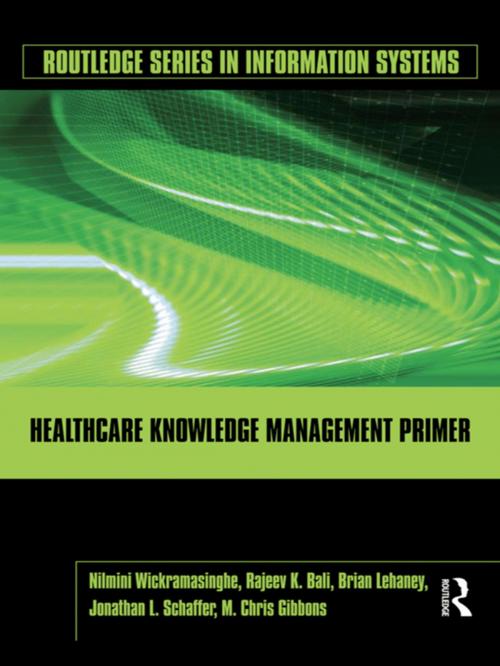Healthcare Knowledge Management Primer
Business & Finance, Industries & Professions, Information Management| Author: | Nilmini Wickramasinghe, Rajeev K. Bali, Brian Lehaney, Jonathan Schaffer, M. Chris Gibbons | ISBN: | 9781135847432 |
| Publisher: | Taylor and Francis | Publication: | May 15, 2009 |
| Imprint: | Routledge | Language: | English |
| Author: | Nilmini Wickramasinghe, Rajeev K. Bali, Brian Lehaney, Jonathan Schaffer, M. Chris Gibbons |
| ISBN: | 9781135847432 |
| Publisher: | Taylor and Francis |
| Publication: | May 15, 2009 |
| Imprint: | Routledge |
| Language: | English |
Quality care of patients requires evaluating large amounts of data at the right time and place and in the correct context. With the advent of electronic health records, data warehouses now provide information at the point of care and facilitate a continuous learning environment in which lessons learned can provide updates to clinical, administrative, and financial processes. Given the advancement of the information tools and techniques of today’s knowledge economy, utilizing these resources are imperative for effective healthcare. Thus, the principles of Knowledge Management (KM) are now essential for quality healthcare management.
The Healthcare Knowledge Management Primer explores and explains essential KM principles in healthcare settings in an introductory and easy to understand fashion. This concise book is ideal for both students and professionals who need to learn more about key aspects of the KM field as it pertains to effecting superior healthcare delivery. It provides readers with an understanding of approaches to KM by examining the purpose and nature of its key components and demystifies the KM field by explaining in an accessible manner the key concepts of KM tools, strategies and techniques, and their benefits to contemporary healthcare organizations.
Quality care of patients requires evaluating large amounts of data at the right time and place and in the correct context. With the advent of electronic health records, data warehouses now provide information at the point of care and facilitate a continuous learning environment in which lessons learned can provide updates to clinical, administrative, and financial processes. Given the advancement of the information tools and techniques of today’s knowledge economy, utilizing these resources are imperative for effective healthcare. Thus, the principles of Knowledge Management (KM) are now essential for quality healthcare management.
The Healthcare Knowledge Management Primer explores and explains essential KM principles in healthcare settings in an introductory and easy to understand fashion. This concise book is ideal for both students and professionals who need to learn more about key aspects of the KM field as it pertains to effecting superior healthcare delivery. It provides readers with an understanding of approaches to KM by examining the purpose and nature of its key components and demystifies the KM field by explaining in an accessible manner the key concepts of KM tools, strategies and techniques, and their benefits to contemporary healthcare organizations.















